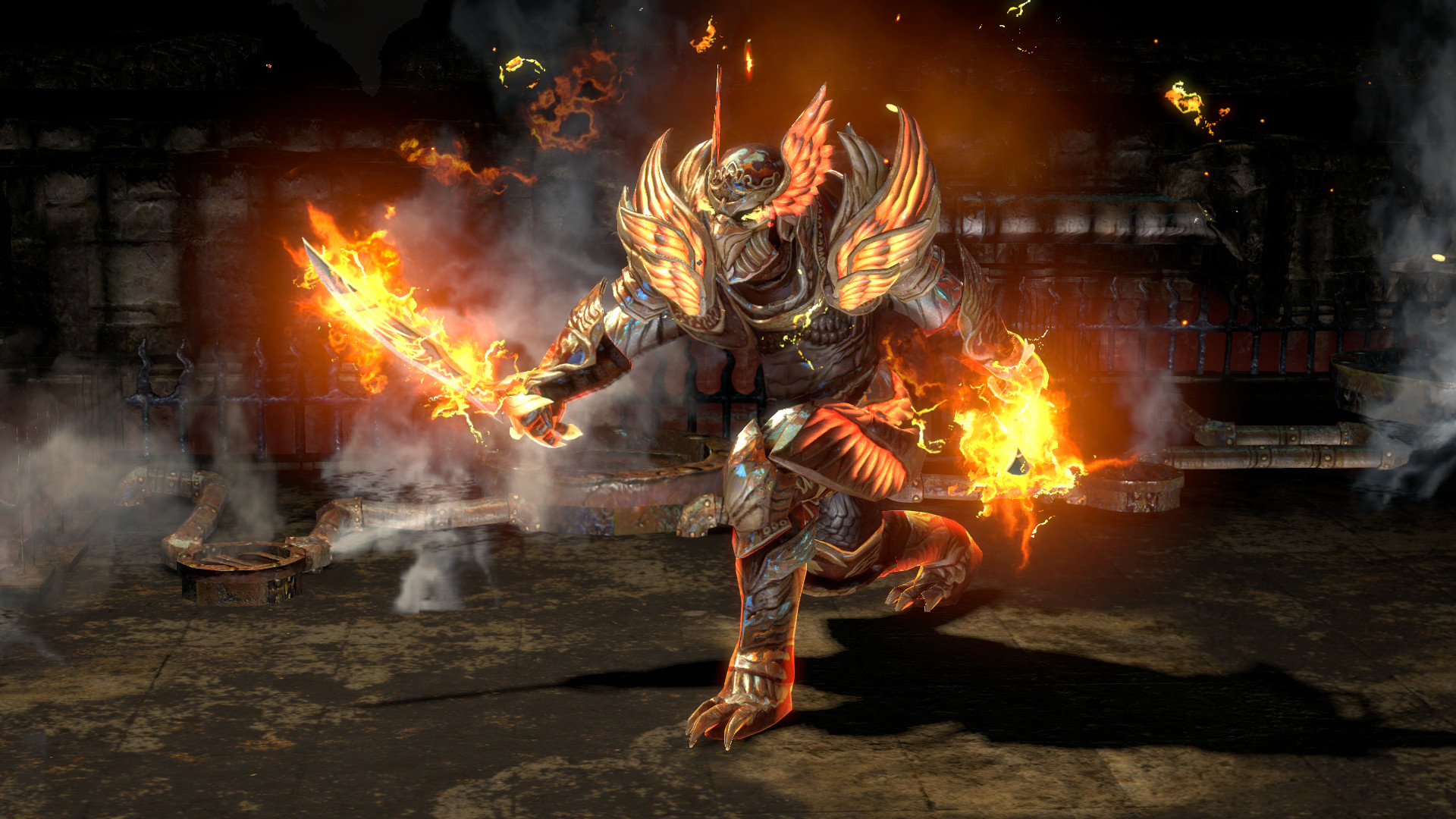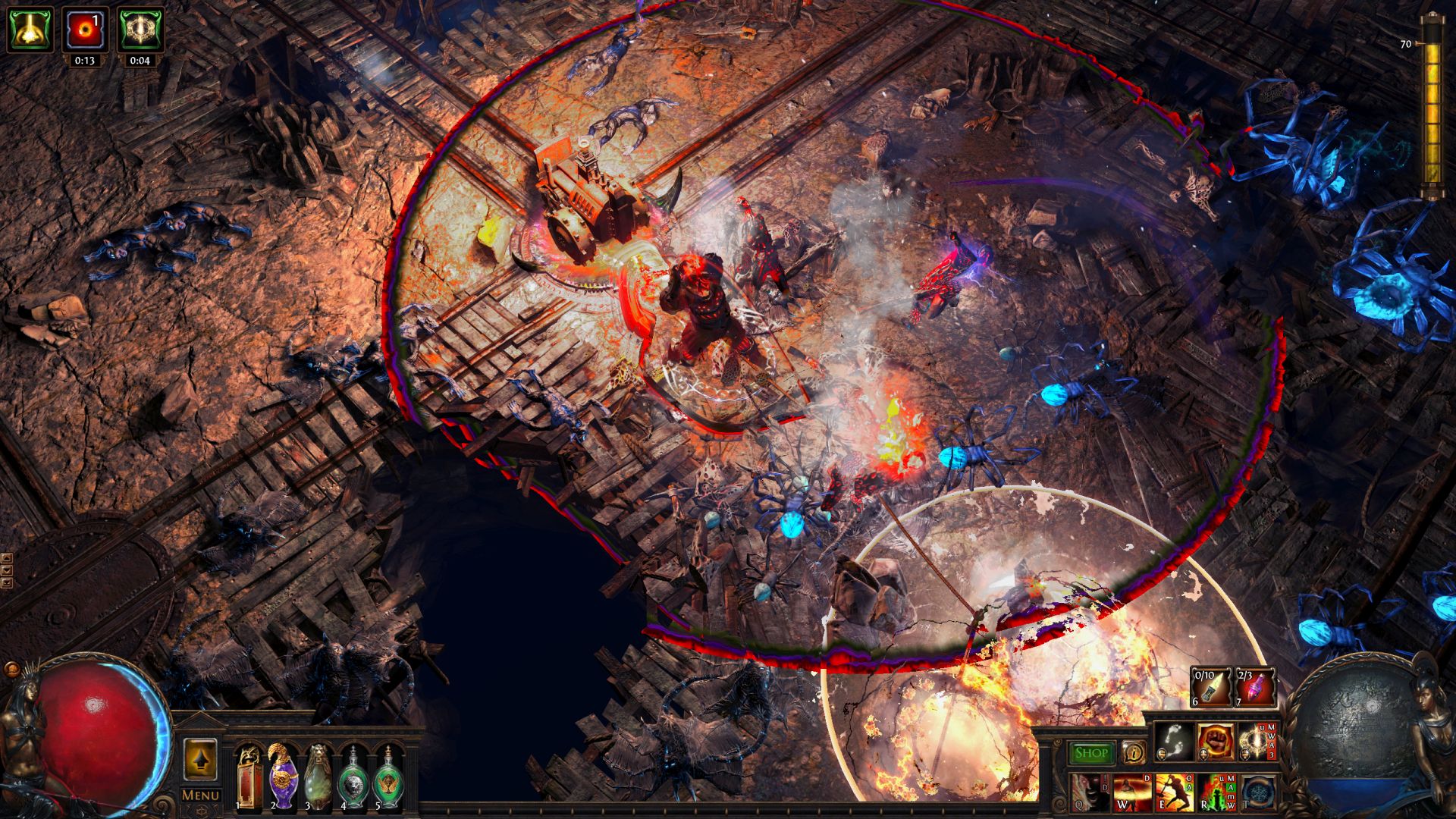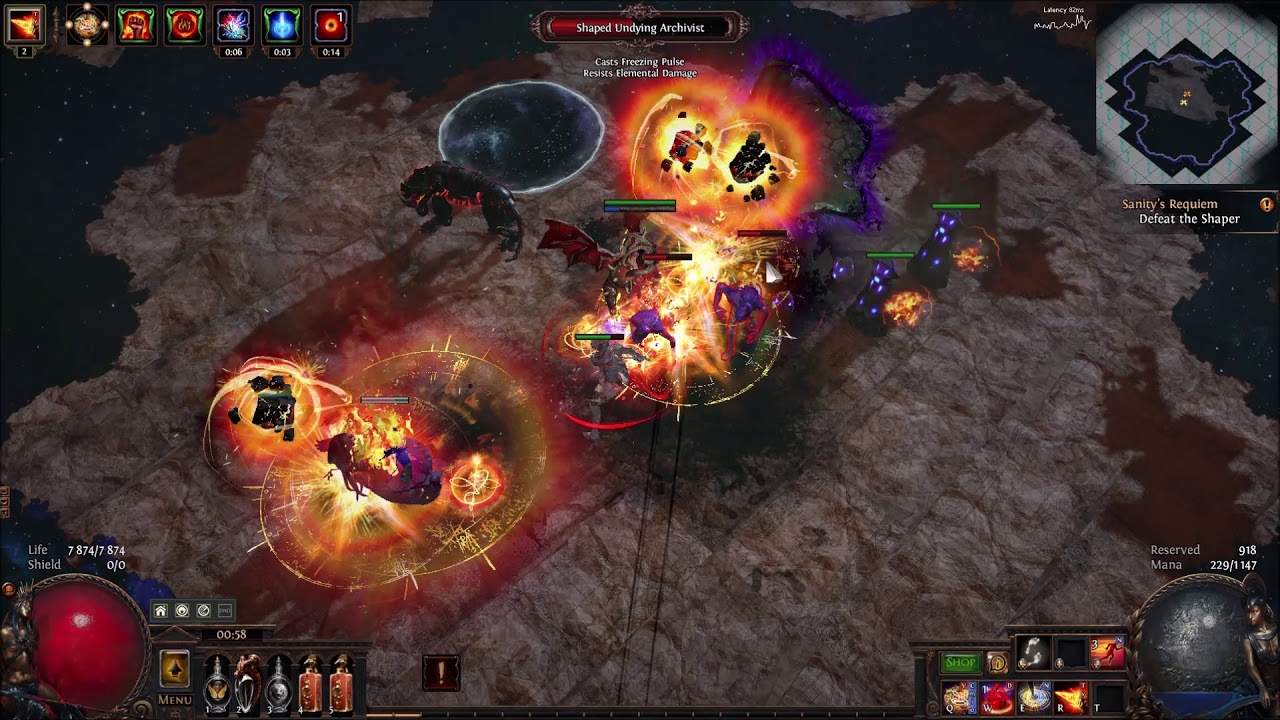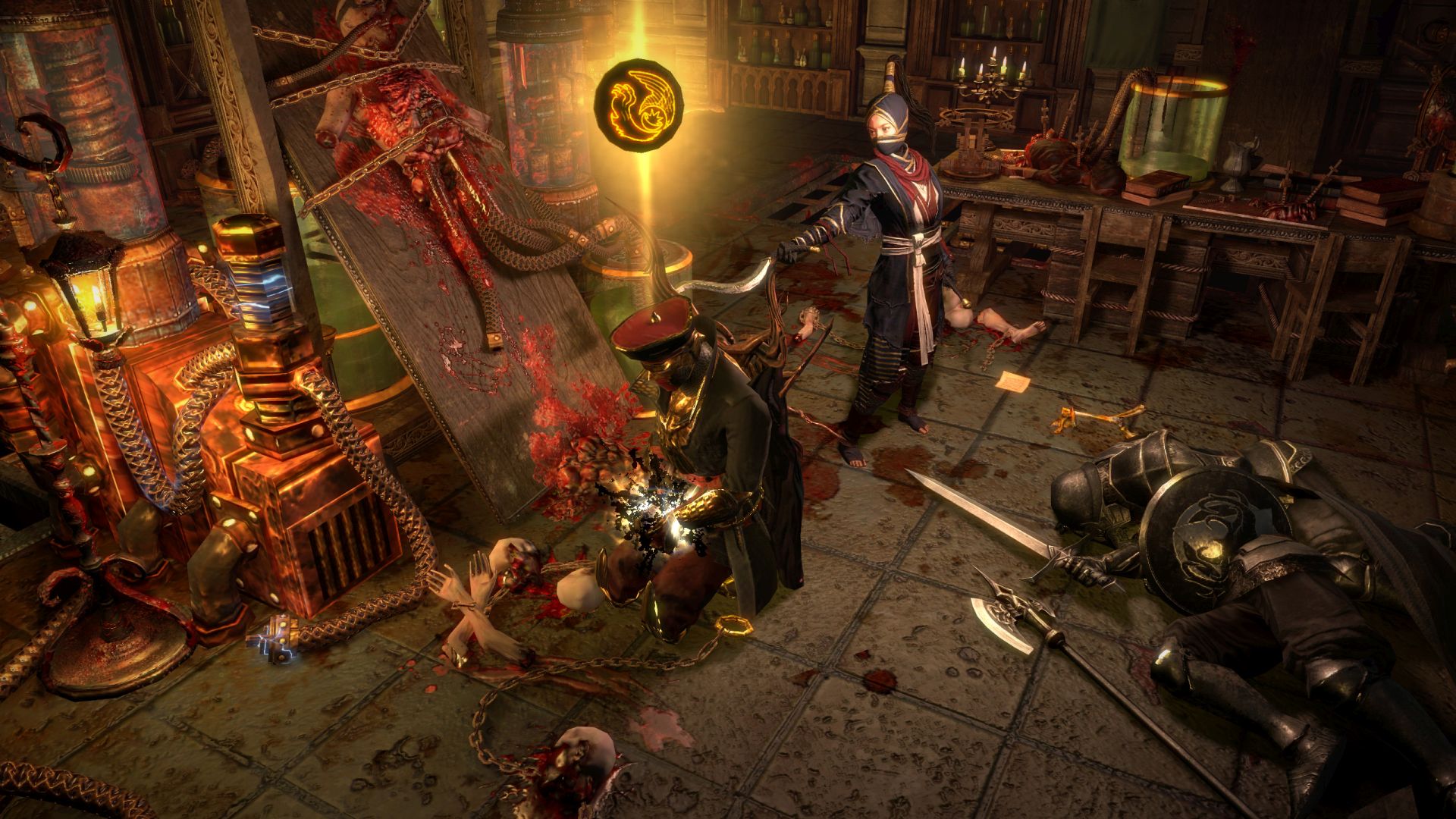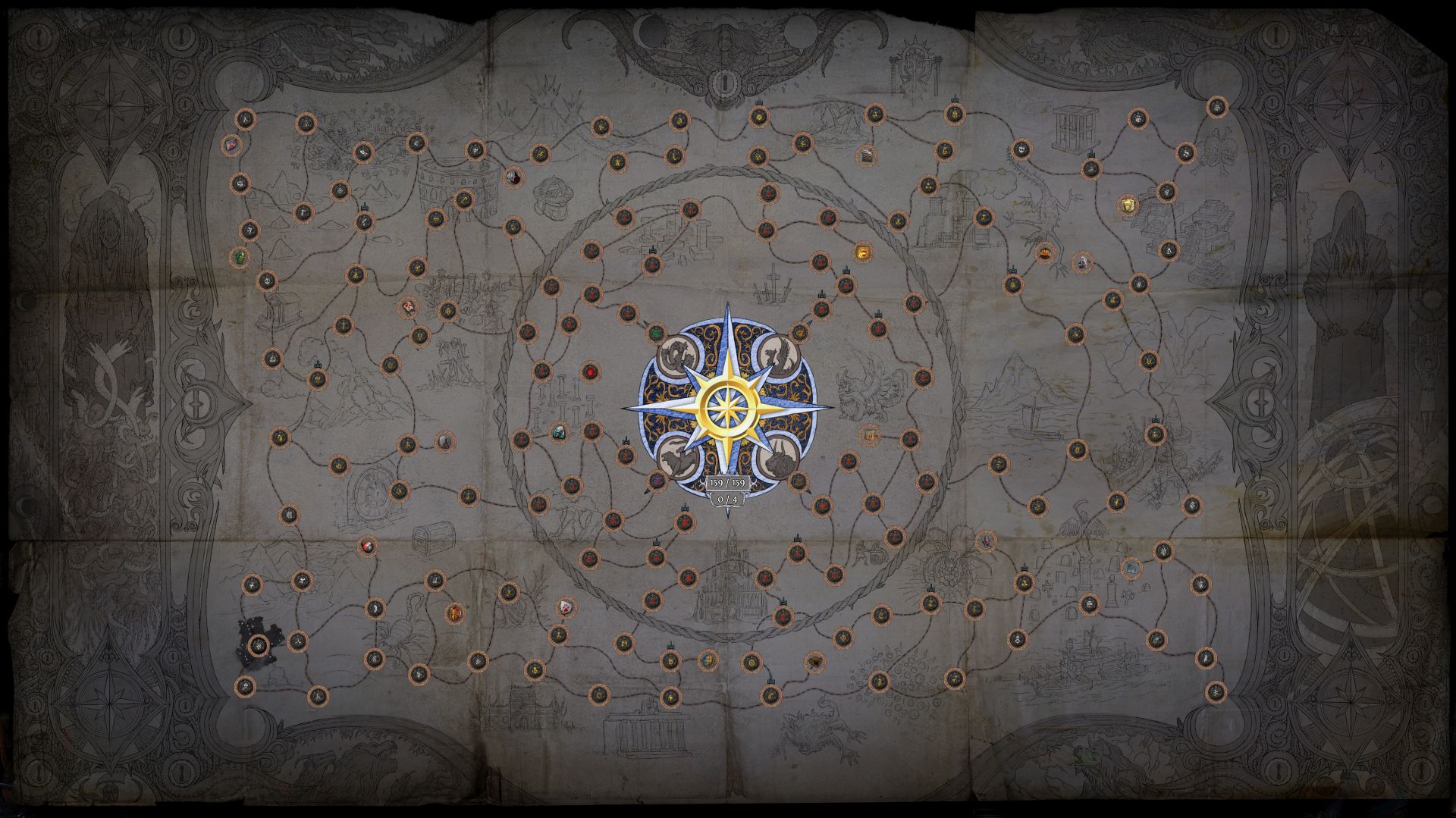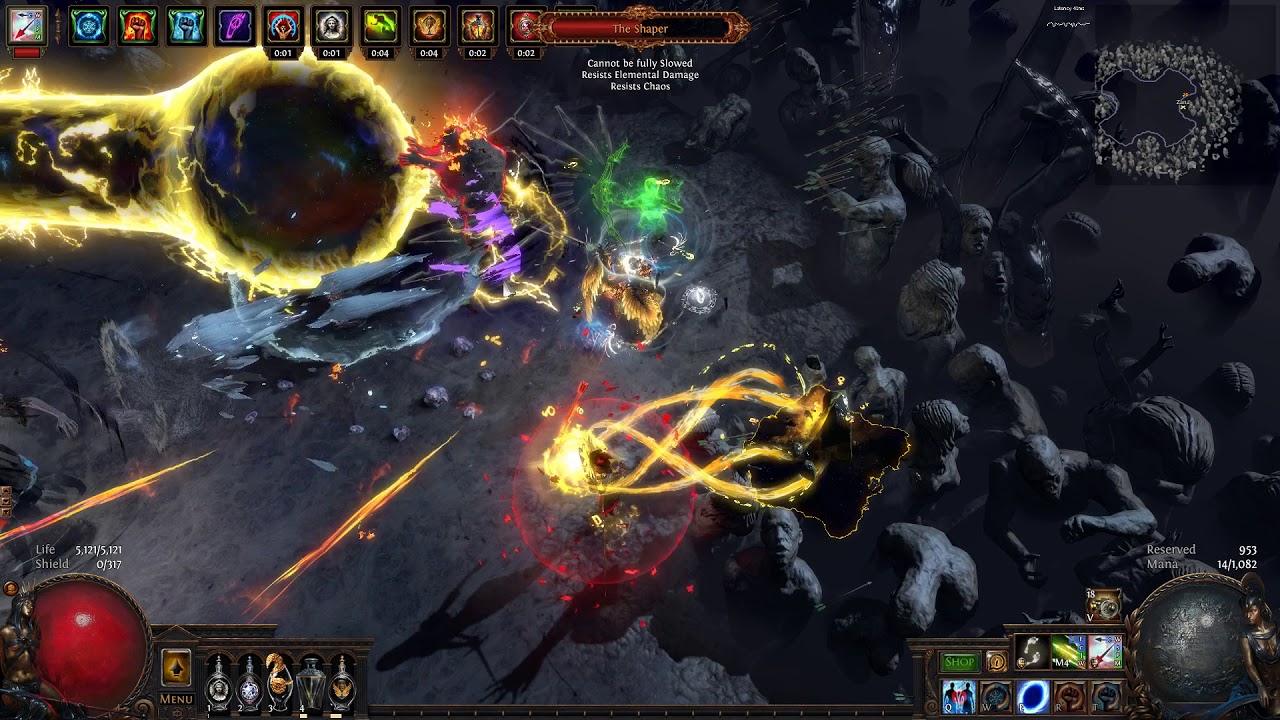
It’s the season of looters, in case you haven’t heard. Assassin’s Creed Odyssey will offer New Game Plus and its Fate of Atlantis DLC in the coming days, further bolstering its smorgasbord of action RPG content. Tom Clancy’s The Division 2 from Ubisoft Massive will look to continue the success of the original while introducing new concepts and ideas (while also fixing a number of bugs present in the private beta).
BioWare’s Anthem has been dominating headlines for the better part of last month, either because of its cosmetic microtransactions or whether the full game will be “worth” getting into. Heck, even Destiny 2 should have an announcement about its next “premium content release” Joker’s Wild very soon.
In these constant conversations about monetization and value for money, whether on-going support and new content justifies RNG loot boxes, which game will the “hot” new thing for players to waste their lives on and whatnot, there’s a curious free to play action RPG that continues to impress. No, not the one crafted by the mad geniuses in the north, Digital Extremes. This one hails from New Zealand and was developed by fans who wanted a true follow-up to Blizzard Entertainment’s Diablo 2. From there, it morphed into what’s arguably the standard-bearer for action RPG looters today. Say hello to Grinding Gear Games’ Path of Exile.
"When talking about value, people look at the major updates that the game has received as evidence that it’s the superior game."
Not that it’s anything new so think of it as more of a “long time no see” than a hello. You’ve probably heard Path of Exile mentioned in subjects like “Diablo Immortal is a major disappointment” or “Where is Diablo 4?” In a rather infamous stunt following the reveal of Diablo Immortal, someone purchased the web domain for “playdiablo4.com” and made it redirect to Path of Exile.
When talking about value, people look at the major updates that the game has received as evidence that it’s the superior game. Look at some of the expansions introduced in 2018 alone. There’s the Bestiary League in March 2018 which introduced a new monster capturing mechanic and Beastcrafting (or sacrificing beasts for creating and augmenting items). The concept wasn’t half-bad, even if the capture mechanics were somewhat clunky. Next was the Incursion League in June 2018 which saw players time-traveling to ancient ruins and influencing their overall construction for better rewards when raiding them in the present day.
The Delve League arrived in August 2018, adding an endlessly scaling dungeon that’s been requested heavily by fans. Players would gather Sulphite, venture into the Azurite Mines and stick close to a crawler to avoid the encroaching darkness. Varying encounters like Azurite creatures, rogue Exiles, reanimated machines and whatnot would provide items, currency and Azurite. Azurite was used to upgrade the crawler or craft dynamite to destroy cracked walls for hidden secrets. Despite a number of issues – many which were resolved throughout the league – Delve was a success, especially when it came to the mechanically challenging fight with Aul, the Crystal King.
"All this new content is great and will attract players, new and old, back to the game but how does Path of Exile keep incentivizing players to get on the grind, yet again?"
Betrayal arrived in December 2018 and is currently on-going. The mysterious Immortal Syndicate is enacting their conspiracy of necromancy on Wraeclast. Teaming with Jun Ortoi, players bust up Syndicate operations, enticing members to betray their comrades and gather more intelligence about the big boss. Syndicate members can be imprisoned for more intelligence, opening up information about the different department heads and their safe houses (which can then be raided). You can manipulate and promote members to influence the appearance of certain rewards. All of this goes towards eventually uncovering and battling the final boss, the Lifegiver.
Everything mentioned above is noteworthy for one big reason – they’re all Leagues. Much like Diablo 3‘s Seasons, Leagues are around for three months or so, giving you a limited amount of time to complete their respective challenges. The new gameplay content – and not the new Unique items and Skill Gems – is limited to the League until eventually rolled into the main game.
Starting a new League means creating a new character. Once the League ends, that character will be migrated over into the base Standard or Hardcore League. You’d ask then how the player base can just keep making new characters every time a new League starts. Heck, how can some one make multiple characters at all until the end of time?All this new content is great and will attract players, new and old, back to the game but how does Path of Exile keep incentivizing players to get on the grind, yet again? Especially when you have to play the entire game, from the first act till the end-game, all over again.
It’s not an easy answer but we can start by looking at some of the obstacles. Path of Exile‘s gameplay is easy to get into, make no mistake. However, gearing can be fairly confusing, what with gem slots, different attack gems and support-based based gems, different coloured gems, the number of slots on gear, ensuring the slots are linked together and so on. If gem slots aren’t linked, then you can’t benefit from support gems for additional damage or important effects like Blasphemy (which turns all Curses into auras, which means no constant recasting) or Cast on Damage Taken (which triggers certain spells when a damage threshold is reached).
"Then there’s the Passive Skill Tree. Upon opening it, you’re granted by a monstrous tree of branching skills."
Gold is non-existent – the main currencies are different items that have different effects on equipment. There are items for changing gem slot colors, linking those slots together, changing the number of slots etc. but these are governed by RNG. Perhaps the best example is a Chaos Orb which re-rolls your item in unpredictable ways. Chaos Orbs will drop in higher-level play and form one of the core currencies in player trading.
When dealing with NPC vendors, players could just as easily trade Scrolls of Wisdom (which identify unknown items), gems, and even items for new gems and equipment. Knowing how to take a Common item and warping it into something you’d potentially want to use just because it has the right number of slots, links and maybe some of the colors you want is an important part of the experience. It’s also incredibly complicated, tedious and heavily RNG-based, which means if you don’t have enough currency to pour into it, then the item could be good for nothing. You could pour tons of currency in and still have subpar results.
Then there’s the Passive Skill Tree. Upon opening it, you’re granted by a monstrous tree of branching skills. Don’t worry – if you chose any starting class besides Scion, you’ll have a single starting point in the tree. Each level gained awards a Passive Skill point but you also get some points for free from quests. The problem is deciding what to take, especially since certain Passive Skills can only be gained by following certain paths. Do you pick up additional health, mana regeneration and something called “+1 to Frenzy Charge”?
"Respeccing an entire build at whim is tough if you don’t have enough Orbs of Regret. It’s not as simple as, say, changing skills once they’re off cooldown in Diablo 3 or The Division."
Do you want to specialize in swords as a Ranger or stick to the bows? Claws for the Champion or swords? You start to learn pretty early about the necessity of planning ahead. Passive Skill points can only be refunded with Orbs of Regret, which either drop from completed quests or in the open world from random enemies. Respeccing an entire build at whim is tough if you don’t have enough Orbs of Regret. It’s not as simple as, say, changing skills once they’re off cooldown in Diablo 3 or The Division.
Once you finish the first four story Acts and venture into the Fall of Oriath, something quickly begins to dawn on you. You’re dying a lot more frequently. Resistances – or lack thereof – are the culprit. Did you pick up gear that has good resistances to fire, cold, lightning and chaos? No? Stacking armour and health won’t exactly be the best substitute then. You could run a skill that provides constant elemental resistance but it will eat up a large portion of your mana.
There are so many more complex mechanics though. There are Essences, yet another currency for upgrading items with modifiers that are specific to the item type and level. Past Leagues like Abyss and Breach with their own intriguing items like Abyssal belts and Gems start cropping up near the end-game. Exalted Orbs enchant items with a new random modifier and are one of the most valued currencies in the game. Divination Cards can be collected and packs of them sold for specific items. Scarabs can be used to influence the number of specific encounters, drop rates of certain items and so on in areas.
At this point, Path of Exile looks like a complex beast that’s nearly impossible to get into even if you use the in-depth and extremely helpful tutorial guide. So what keeps people coming back besides the admittedly satisfying gameplay?
"The sheer freedom available, combined with all the different levels of randomization, provide an experience that players can keep replaying."
You’ll probably have noticed that there’s quite a lot of flexibility for creating your build of choice. The forums for Path of Exile are awash in build guides, from the overpowered to the meme-tastic. The sheer freedom available, combined with all the different levels of randomization, provide an experience that players can keep replaying.
Here are some examples of excellent builds which each play differently – an Armageddon Brand Elementalist that drops flaming meteors on targets while also marking them with a Curse, supported by an Orb of Storms for priming more damage and Flame Dash to zip around quickly. A Double Strike Gladiator with dual Bloodseeker claws for instant life leech, backed by clones for additional damage. A Frostbolt/Frost Nova Occultist with Spell Echo – fire one Frostbolt and trigger Frost Nova for some icy explosions which go off more than once, clearing entire swathes of foes.
Throw in six different classes, each with three Ascendancies akin sub-classes and there’s even further opportunity to diversify. Each Ascendancy has its own skill tree with limited Passive Skill points to allocate. Even if you replay the same class with the same Ascendancy again and again, it can function in a significantly different way from the previous time.
Building your Passive Skill tree and skills for your needs is a big part of the appeal. It doesn’t hurt that the combat accommodates tons of diverse play-styles while requiring mechanical skill where it counts. Not every boss fight can just be face-tanked and rolled. And while skills like Armageddon Brand can clear screens of foes, it truly shines when keeping a distance rather than rushing into hordes.
"It’s almost like a rogue-lite except your character is migrated to the Standard League when, say, Betrayal ends."
While a number of action RPG looters may place the reliance on higher tier loot and how it significantly alters your basic skills, Path of Exile goes in a slightly different direction. Poet’s Pens and Oni-Goroshis are powerful on their own, don’t get me wrong, and the Loreweave goes well with pretty much everything. How you use these items for your skills and build in question is how you go from powerful to borderline broken OP. More importantly, it also ensures that players with a clean slate in every League can still dominate all the different challenges if they have mechanical knowledge of certain fights and spec properly for survivability.
It’s almost like a rogue-lite except your character is migrated to the Standard League when, say, Betrayal ends. All the different modifiers and randomness for items may also seem tough to really suss out but it’s possible to get a hold on it and influence for your benefit. And unlike your standard rogue -lite, you’re not alone during a League. Other players can be traded with and someone may have the item you need.
Perhaps one of the most brilliant things about Path of Exile is how it embodies a rogue-lite methodology with its Leagues while keeping the core game intact. Players can develop their own builds and run them through the newest leagues. This approach allows for gaining different items but the core tenets and blueprint for the build remain intact (and anything that’s missing can be traded, if you’re that desperate). When a League ends, this can be considered as the end of a typical rogue-lite “run”. The player could come back in a different League and try a different build.
"Some builds may become weaker and others fall by the wayside. In other games, this may be disheartening but here, it’s an opportunity to try something new that may be even more stupidly powerful."
However, a massive new update for the game doesn’t just mean a new League. Sure, they bring new mechanics but the game itself is also updated in meaningful ways. The Betrayal League saw pretty much every Unique item being buffed. Stat Sticks, a staple of many melee builds, were gone and while rued as the downfall of melee combat, it led to tons of other builds thriving. Some builds may become weaker and others fall by the wayside. In other games, this may be disheartening but here, it’s an opportunity to try something new that may be even more stupidly powerful.
Keep in mind that this does depend on one’s outlook. I couldn’t imagine investing so many Exalted Orbs and Orbs of Chaos to perfect a Stat Stick build, only to see it nerfed into oblivion. However, these changes are usually made between major updates so it wouldn’t completely ruin one’s run through a League. Once you get a handle on the game, it’s not too difficult to build your way back up, use player trading to get the right items and find something else that’s overpowered. It’s challenging, for sure, and the average player will definitely need a build guide. But it’s that challenge, those RNG factors and permutations along with the core gameplay that keeps players on their toes.
For those who aren’t interested in time-limited Leagues and want a consistent character to keep playing with – so essentially, a less “rogue-lite” approach to the looter and more of a traditional action RPG looting experience – Path of Exile caters to them as well.
Before update 3.0, the game required completing the base four acts under three different difficulties. After that, you could access the Atlas of Worlds, the end-game system which consists of Maps. These could be purchased or dropped from random enemies. Each had their own random modifiers and opportunities for loot – even the same map could play out differently depending on enemy composition and conditions. Fall of Oriath brought several new story Acts to the game and a complete reworking of the progression. Completing the same content in three different difficulty settings was no longer necessary. In fact, the new content’s difficulty would serve as a good teaching tool on why resistances are so important.
"As these major content updates release, Grinding Gear Games is still updating the game, adding new features like Private Leagues, bug fixes and other essential changes."
The War for the Atlas expansion revamped the Atlas of Worlds, adding new maps, the Elder as a boss, the Elder Guardians and new items to pursue. Certain areas could be “influenced” by either the Shaper or Elder and you could complete the tougher challenges within for a chance at the new Shaper and Elder items. Link together different maps with Elder influence and you can battle an Elder Guardian. Defeat all four Elder Guardians and you could battle the Elder himself. That’s not taking into account the Shaper’s Strongholds which carry Orb of Horizons for reforging maps of the same tier, Cartographer’s Chisels for improving map quality, rare Shaper items and more. Don’t get me started on the Memory Fragments and battle to take down Uber Elder.
As these major content updates release, Grinding Gear Games is still updating the game, adding new features like Private Leagues, bug fixes and other essential changes.
Hilariously enough, the studio revamped the progression of the core game again with Betrayal. Past Leagues like Incursion, Betrayal and Delve were rolled into the main game (and improved as was the case with Bestiary League). The Masters system was completely revamped to incorporate each of the above Leagues and they would have their own missions in the Atlas. There was even a ton of new dialogue recorded for characters like Einhar, making them beloved to fans. The Atlas itself saw several maps shuffled and changed across tiers. This isn’t taking into account the sheer number of skill gems and items that further revamped the number of ways to approach the game.
At the end of the day, Path of Exile is complex. Even the most hardcore loot grinder will take a while to pick up the inherent systems (as they usually say, “Your first character is often the worst”). How it allows players to refine their builds and take on new challenges with each League while introducing new ways to re-roll and modify loot ensuring these loop into the core game is simply incredible to behold though. The end-game is less about leveling up and more about getting the right set-up for your play-style of choice. Then you take that play-style into pretty much everything the game will throw at you – which is a very large amount of stuff – and see how it fairs. Everything loops back into the Atlas and helping you get better stuff.
"If Path of Exile has proven anything though, it’s that it can cultivate and cater to that obsession while warping it inside out into something far more significant."
Once you get bored of it, you can try a completely different play-style that turns how we typically perceive the genre (or at least what other looters would have us believe) on its head. Path of Exile isn’t limited by Gear Sets, sub-classes, each class having only an X number of abilities, and whatnot. These gameplay systems are at the forefront of the design, almost obsessively so, even when so many different systems are added in. It all loops back and ties together.
Is every update from Grinding Gear Games perfect? No, but that bent of mind, to continuously push what’s possible in a free-to-play action RPG, and being fair to players while not making the grind “easy”, is one reason to keep following it. It’s not a question of just constantly putting out updates. Staying true to the core gameplay loop and values of the experience even after those updates is key.
And if you get really bored and decide you’re done, the entire game could completely change in just a matter of months. The player base may seem constantly obsessive in its own right, devouring content incessantly and always demanding more. If Path of Exile has proven anything though, it’s that it can cultivate and cater to that obsession while warping it inside out into something far more significant.








